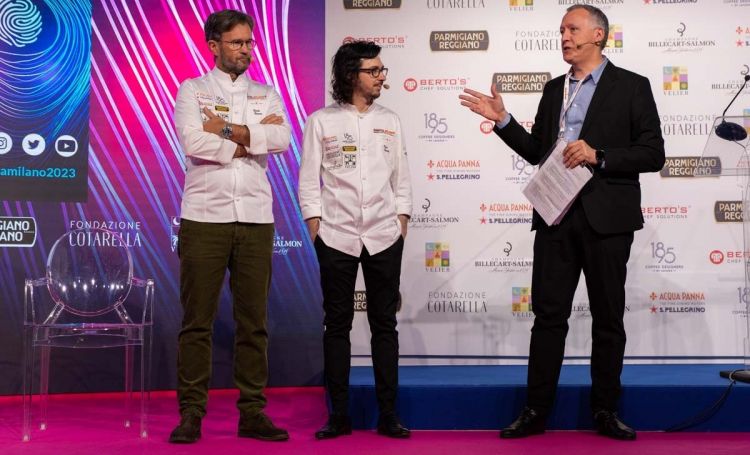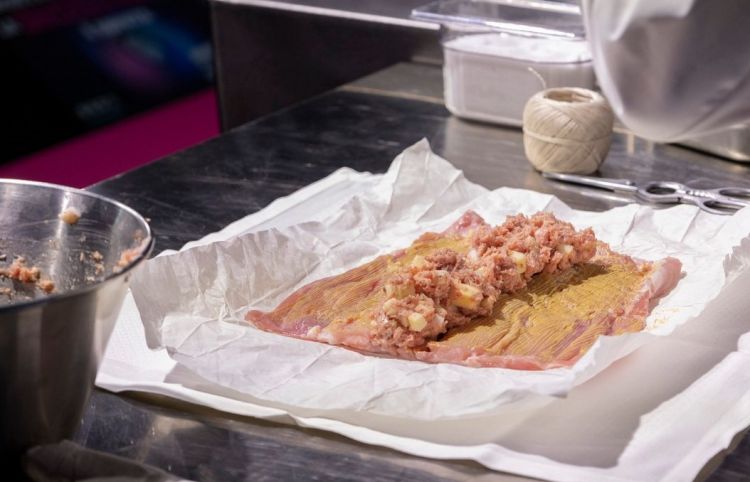Carlo Cracco took the stage at the 18th edition of Identità Milano with the assertiveness of someone who has attended this congress seventeen times. He’s a point of reference, as only a chef "who has made fundamental contributions to the creativity and progress of Italian cuisine" can be, as Gabriele Zanatta recalled introducing his lesson. He shared every aspect of the lesson with Luca Sacchi, executive chef at Cracco in Galleria, something more than a right arm for the Venetian chef.
“What counts most,”
Cracco said opening the speech, “isn’t being great or having invented a new technique. What counts is what you have inside. This is why I want to thank
Identità Golose, because it gives us another way, different from a restaurant, to express ourselves, to show the passion and above all the spirit of these guys, of the team that works with me. Without them, I couldn’t go on.”

Cracco and Sacchi with Gabriele Zanatta, who presented the lesson
with the brigade of
Cracco in Galleria prepared a different dish from the one that
Paolo Marchi chose as the symbol of the 2023 edition of
Identità Milano,
Avocado, kiwi, coriander, a creation born from the idea of composing elements that were once 'exotic', but are now grown in Italy, thus illustrating the need to face change, even in the restaurant industry (we wrote about it
in this article).
For the masterclass instead they presented a new dish, which will be included in the menu of
Cracco in Galleria in the coming weeks:
Rabbit in white royale. “We’ve been thinking about this idea for several months,”
Sacchi explained. “It then took shape a few weeks ago and we will soon offer it to the public. This dish requires strong use of ancient, traditional techniques, made current.”
This dish also stems from the desire to enhance an ingredient, rabbit, “which is often overpowered by other ingredients. We have tried to maintain the nature of this meat, taking our cue from an ancient recipe. In the past, in our lands, people cooked rabbit as a whole, over embers. This technique has a strong risk of drying out the meat. To avoid this, the rabbit was soaked in curdled milk. In our case we make a stuffed rabbit and to hint at this ancient technique, we included mascarpone in the stuffing.”

This is also the first white ingredient to be mentioned, but, as the name of the dish itself suggests, this colour is a common thread: a white rabbit base, almond milk, white port, white pine nuts, cooked lard. The element of royale is reminiscent of another technique with a long tradition, “a technique that requires great application and sensitivity, as it implies the use of blood to bind the sauce, a step that is very hard to get right. In our recipe, instead, we use rabbit liver for the same purpose.”
Then
Luca Sacchi took the
Identità Milano audience to the kitchen of
Cracco in Galleria, with a playful but also seriously passionate spirit: “Working with
Carlo also means presenting him a dish that you think you have perfectly balanced and seeing him doubtful. When he makes that face, which I know so well by now, you realise that something is still missing. At first it can be disappointing, but I am very lucky to work with a chef like
Cracco, because it is this attitude of his that always pushes me one step further, in search of an additional ingredient that can give the dish a twist.”
Which in this case was lentisk oil: “It has the strong fragrance of pinecones, of woodland. It breaks up the flavour and takes the dish into a new dimension, without distorting it, because it plays on the same notes as the other ingredients.” Observing on stage the many preparations required for this dish,
Gabriele Zanatta emphasised that it was an interesting way of reclaiming the concept of a 'cooked cuisine', which requires steps and cooking techniques, commitment and time, instead of relying only on an assembly of different ingredients to make up the dish.
“I also am lucky,” commented
Sacchi, “because, in my daily life, every service requires this: the act of cooking and the need to do it to the best of my ability, day after day, repeating the gestures. That practical act also requires an emotional involvement, which makes each dish that is cooked unique. It is just as important as creativity, the ideas from which our dishes are born.”
After presenting the completed dish to the audience,
Carlo Cracco returned to the themes of the interview, also by
Gabriele Zanatta, that we published a few days ago on the eve of the congress: “As chefs we must be united and we must feel the responsibility to build a common home for young people who lack a common voice to represent them. Today politicians are paying more attention to our demands, which is why it is even more important to be united.” A necessary call, welcomed by a long and well-deserved applause from the
Identità Milano 2023 audience.
Translated into English by Slawka G. Scarso